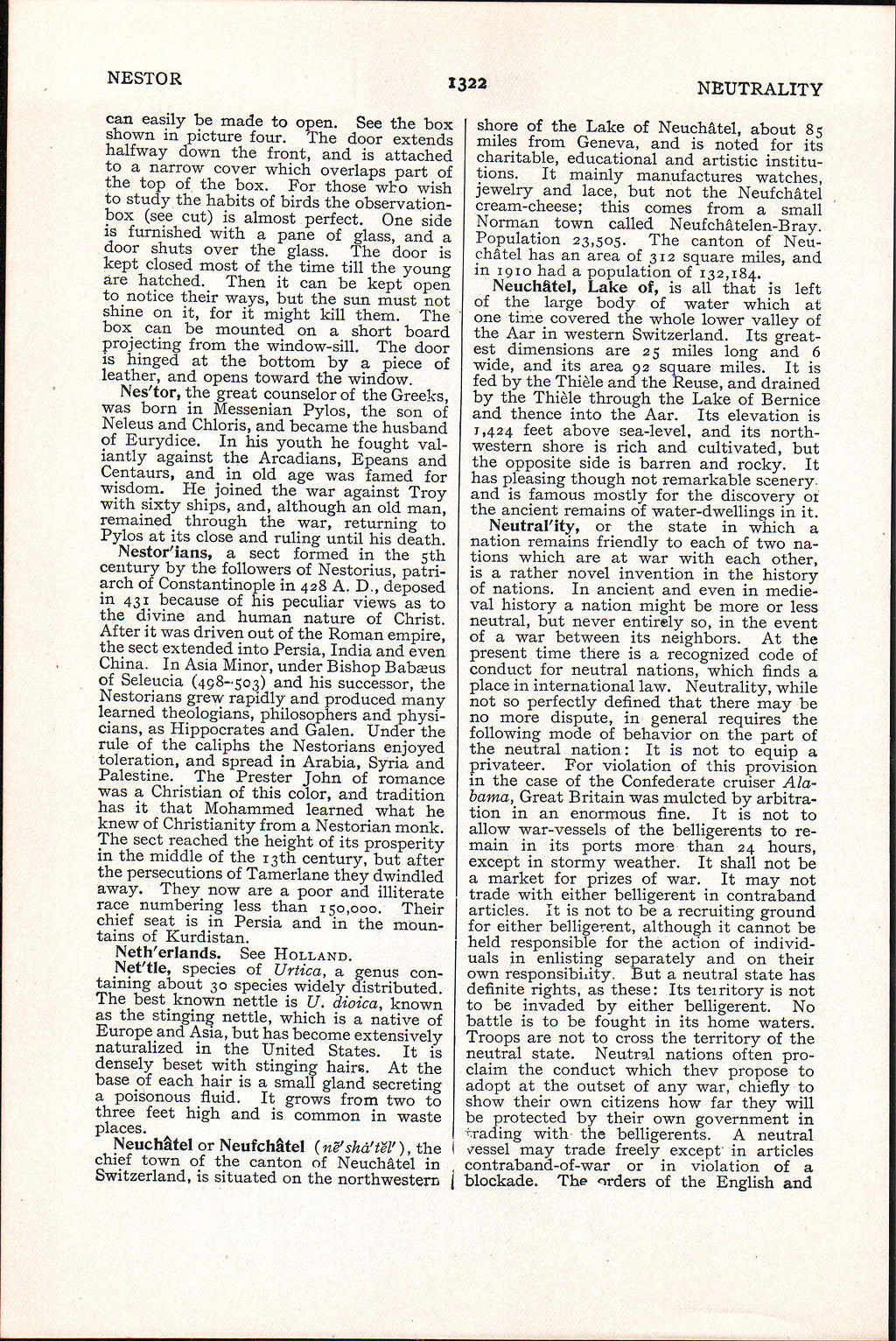can easily be made to open. See the box shown in picture four. The door extends halfway down the front, and is attached to a narrow cover which overlaps part of the top of the box. For those who wish to study the habits of birds the observation-box (see cut) is almost perfect. One side is furnished with a pane of glass, and a door shuts over the glass. The door is kept closed most of the time till the young are hatched. Then it can be kept open to notice their ways, but the sun must not shine on it, for it might kill them. The box can be mounted on a short board projecting from the window-sill. The door is hinged at the bottom by a piece of leather, and opens toward the window.
Nes′tor, the great counselor of the Greeks, was born in Messenian Pylos, the son of Neleus and Chloris, and became the husband of Eurydice. In his youth he fought valiantly against the Arcadians, Epeans and Centaurs, and in old age was famed for wisdom. He joined the war against Troy with sixty ships, and, although an old man, remained through the war, returning to Pylos at its close and ruling until his death.
Nestor′ians, a sect formed in the 5th century by the followers of Nestorius, patriarch of Constantinople in 428 A. D., deposed in 431 because of his peculiar views as to the divine and human nature of Christ. After it was driven out of the Roman empire, the sect extended into Persia, India and even China. In Asia Minor, under Bishop Babæus of Seleucia (498-503) and his successor, the Nestorians grew rapidly and produced many learned theologians, philosophers and physicians, as Hippocrates and Galen. Under the rule of the caliphs the Nestorians enjoyed toleration, and spread in Arabia, Syria and Palestine. The Prester John of romance was a Christian of this color, and tradition has it that Mohammed learned what he knew of Christianity from a Nestorian monk. The sect reached the height of its prosperity in the middle of the 13th century, but after the persecutions of Tamerlane they dwindled away. They now are a poor and illiterate race numbering less than 150,000. Their chief seat is in Persia and in the mountains of Kurdistan.
Neth′erlands. See Holland.
Net′tle, species of Urtica, a genus containing about 30 species widely distributed. The best known nettle is U. dioica, known as the stinging nettle, which is a native of Europe and Asia, but has become extensively naturalized in the United States. It is densely beset with stinging hairs. At the base of each hair is a small gland secreting a poisonous fluid. It grows from two to three feet high and is common in waste places.
Neuchâtel or Neufchâtel (nẽ′shȧ′tĕl′), the chief town of the canton of Neuchâtel in Switzerland, is situated on the northwestern shore of the Lake of Neuchâtel, about 85 miles from Geneva, and is noted for its charitable, educational and artistic institutions. It mainly manufactures watches, jewelry and lace, but not the Neufchâtel cream-cheese; this comes from a small Norman town called Neufchâtelen-Bray. Population 23,505. The canton of Neuchâtel has an area of 312 square miles, and in 1910 had a population of 132,184.
Neuchâtel, Lake of, is all that is left of the large body of water which at one time covered the whole lower valley of the Aar in western Switzerland. Its greatest dimensions are 25 miles long and 6 wide, and its area 92 square miles. It is fed by the Thièle and the Reuse, and drained by the Thièle through the Lake of Bernice and thence into the Aar. Its elevation is 1,424 feet above sea-levelt and its northwestern shore is rich and cultivated, but the opposite side is barren and rocky. It has pleasing though not remarkable scenery, and is famous mostly for the discovery of the ancient remains of water-dwellings in it.
Neutral′ity, or the state in which a nation remains friendly to each of two nations which are at war with each other, is a rather novel invention in the history of nations. In ancient and even in medieval history a nation might be more or less neutral, but never entirely so, in the event of a war between its neighbors. At the present time there is a recognized code of conduct for neutral nations, which finds a place in international law. Neutrality, while not so perfectly defined that there may be no more dispute, in general requires the following mode of behavior on the part of the neutral nation: It is not to equip a privateer. For violation of this provision in the case of the Confederate cruiser Alabama, Great Britain was mulcted by arbitration in an enormous fine. It is not to allow war-vessels of the belligerents to remain in its ports more than 24 hours, except in stormy weather. It shall not be a market for prizes of war. It may not trade with either belligerent in contraband articles. It is not to be a recruiting ground for either belligerent, although it cannot be held responsible for the action of individuals in enlisting separately and on their own responsibility. But a neutral state has definite rights, as these: Its territory is not to be invaded by either belligerent. No battle is to be fought in its home waters. Troops are not to cross the territory of the neutral state. Neutral nations often proclaim the conduct which they propose to adopt at the outset of any war, chiefly to show their own citizens how far they will be protected by their own government in trading with the belligerents. A neutral vessel may trade freely except in articles contraband-of-war or in violation of a blockade. The orders of the English and
